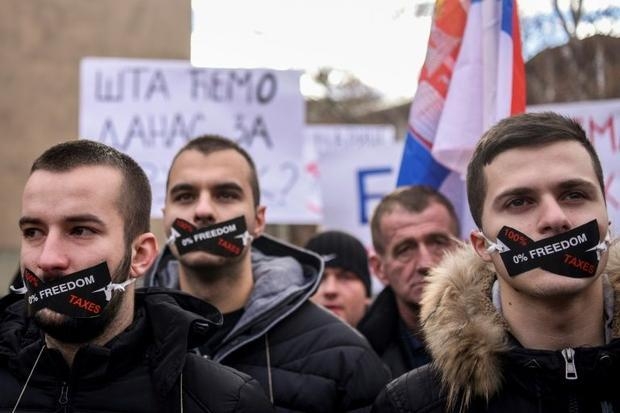Kosovo tests Serbia with vote to build an army

Kosovo will vote Friday on whether to create its own army, in a heavily symbolic show of independence from Serbia that has inflamed tensions between the former wartime foes.
Since breaking away from Belgrade in a guerilla war in the late 1990s, Kosovo has relied on NATO-led forces to guarantee its security.
But at the end of the week – dubbed “Army week” by one Kosovo newspaper – Pristina lawmakers will vote on legislation to transform its own lightly-armed emergency response force, known as Kosovo Security Force (KSF), into a professional army.
The measure is widely expected to pass as it draws support from all political parties in ethnic Albanian-majority Kosovo, except for a minority of ethnic Serb MPs who have boycotted the sessions.
But there is outrage in Belgrade, which refuses to accept the former southern province’s independence and has cast the army plans as a threat to the 120,000 Serbs still living in Kosovo.
Last week Serbian Prime Minister Ana Brnabic said she “hoped” Serbia would not need to use its army against Kosovo, though it is “one of the options on the table.”
Twenty years ago, 13,000 lives were lost – mostly ethnic Albanians – when Serb troops clashed with Kosovo’s ethnic-Albanian independence fighters.
Serbian tabloids have warned of a possible new conflict, with the daily Informer stating “War with Kosovo will start on December 15“, the day after the army vote.
But analysts say it is more likely to remain a war of words.
It will take up to a decade for the KSF to be combat-ready, according to officials.
Even then, its new 5,000 troops will be minnows compared to Serbia’s some 30,000-strong army in addition to fighter planes.
“A military response is not in the realm of reality,” Milan Karagaca, a Belgrade-based military analyst, told AFP.
“Neither they nor we have the means and capacities to wage war and the international community...would not allow it,” he said, adding that an attack on Kosovo would amount to attack on NATO.
Instead, the rhetoric on both sides are “manoeuvres to secure better positions in future negotiations,” he said.
The army vote comes during a low point in relations between Kosovo and Serbia, who are under EU pressure to normalise ties if they want to join the bloc.
Tensions surged in November when Kosovo slapped Serbian goods with a 100 percent tariff in retaliation for Belgrade’s efforts to sabotage it on the world stage.
Serbia has long blocked Kosovo from international organisations, including the UN, and recently upped a diplomatic campaign to sway other countries to revoke recognition of Kosovo’s sovereignty.
Belgrade says it has achieved a dozen reversals, though Pristina disputes the claims and says it is still recognised by some 115 states.
The army move is likely “tied up with the current frustration (in Kosovo) about the recognition issue,” said James Ker-Lindsay, a Balkans expert at the London School of Economics.
“An army is seen as a symbol of statehood,” he said.
NATO, which has four members who don’t recognise Kosovo, has condemned the army move as “ill-timed.”
But Pristina’s core ally Washington has given the green light, calling it a “positive step.”
The commander of the current 2,500-strong KSF, which is trained for crisis response operations, said this week that the new army will be equipped with US weapons and vehicles.
In an interview to Insajderi newspaper, Kosovo’s Prime Minister Ramush Haradinaj said Serbia would not dare to attack, knowing that “America would defend Kosovo.”
He has also stressed it will be an army of “peace” that will not target Serbs but be used to support international forces in places like Iraq and Afghanistan.
The move is broadly popular among the ethnic Albanian majority in Kosovo, where the government has been dealt a series of setbacks in recent months, including a failed bid to join Interpol which it blamed on Belgrade.
There is also widespread frustration over a lack of progress in acquiring visa-free travel status in the EU – something every other Western Balkan state enjoys.
“The government is trying by all means to claim at least one success story among the numerous failures that have happened this year,” said political analyst Imer Mushkolaj. -- AFP
